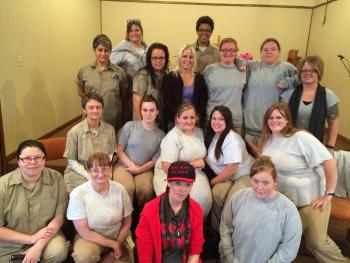Mental Health Association of Nebraska helps people find their purpose
Mental Health Association of Nebraska helps people find their purpose
FOR IMMEDIATE RELEASE (17-69)
CONTACT Cara Wilwerding, Communications Manager
OFFICE 402-479-5712 | cara.wilwerding@nebraska.gov
Note: This is the third of an eight-part series about Vocational and Life Skills programs funded by LB907. Follow along to learn more about the programs’ goals, expectations and successes.
December 1, 2017 (Lincoln, Neb.) – The Mental Health Association of Nebraska (MHA-NE) offers support, promotes wellness and encourages hope in all those struggling with mental health or substance abuse issues.
Incorporated in 2001, MHA-NE is currently the only nonprofit peer run organization in the state. Every person on their staff and 50 percent of their board are living with mental health or substance abuse issues and many have been incarcerated. Each team member has a unique perspective; a perspective that may help others gain and maintain healthy habits.
“We believe that we recover by helping others and giving back,” Executive Director Kasey Moyer said. “We believe a lot in personal responsibility. We’re responsible for our own behavior and recovery and we can’t use anything as an excuse for bad behavior.”
One of MHA-NE’s greatest successes within prison has been introducing their Wellness Recovery Action Plan (WRAP). The program, which addresses a number of physical, mental health and life issues, is currently offered in five Nebraska Department of Correctional Services (NDCS) facilities.
In addition to WRAP, MHA-NE has provided training to help NDCS team members better understand mental health and what it’s like to deal with the associated issues. They are now working on implementing a peer-mentorship program within a number of facilities.
“Individuals who have a longer stay may mentor new people coming in,” Moyer said. “Maybe the newer individuals are struggling with how to live in the facilities and some of the older guys can offer insight. It gives them purpose.”
NDCS Reentry Administrator Grace Sankey-Berman believes MHA-NE’s greatest talents lie in tracking down resources to help individuals who have recently been released. They will do anything possible to help a formerly incarcerated individual struggling with mental health or substance abuse issues, she said. They will help find them jobs, housing, medication, food – anything. They’re willing to work so hard for our population because they understand where they’re coming from.
“They’re reentry soldiers,” Sankey-Berman said of MHA-NE team members. “All of the staff at MHA-NE can relate to our population because they have dealt with at least one of these issues, if not all of them. They have empathy and success in dealing with all sorts of issues. Their connection within the community is amazing.”
In addition to programs in prison, MHA-NE also offers NDCS grant-funded programs in the community. The REAL (Respond, Empower, Advocate, Listen) Program connects peer specialists with those seeking help with reentry planning. While REAL ambassadors primarily work in the community, they also start the process within NDCS facilities from time to time. H.O.P.E. (Higher Opportunities through the Power of Employment) helps individuals find and maintain work based on their preferences and abilities. They also offer a benefits program which helps people apply for benefits that they often don’t even realize are available. Modeled after MHA-NE’s very successful Keya House, they also created the Honu Home with NDCS grant funds. Both facilities provide transitional living options and access to other MHA-NE programming for the target population.
Unrelated to NDCS grant-funded programs, MHA-NE also offers HOME B.A.S.E. (Bullying And Suicides Eliminated), which provides staff and student education on issues relating to mental health, trauma and addiction.
And while programming is so vital to success, it is equally important to have peers who believe in you, NDCS Reentry Program Manager Steve Fannon explained. MHA-NE team members believe in NDCS’ population – even when no one else may. Fannon described the difficulty in finding resources for one individual, incarcerated at the Nebraska Correctional Center for Women (NCCW), due to her gang affiliations. MHA-NE stepped up, provided services and never wavered. They stuck with her, ultimately helping her find the resources she needed.
“They believe in the power of redemption more than anybody I can identify,” Fannon said. “MHA-NE is the most resounding in my mind in regards to that.”
Moyer said MHA-NE is evidence that anything is possible. Everyone she works alongside has struggled, just as the population they are currently serving.
But that struggle and that knowledge means her team members can hold themselves and their clients accountable.
“You watch people connect with peers; feel like they’re not being judged,” Moyer said. “You provide opportunity to people and they will take it. We like to see people get their lives back and find their purpose.”
###

